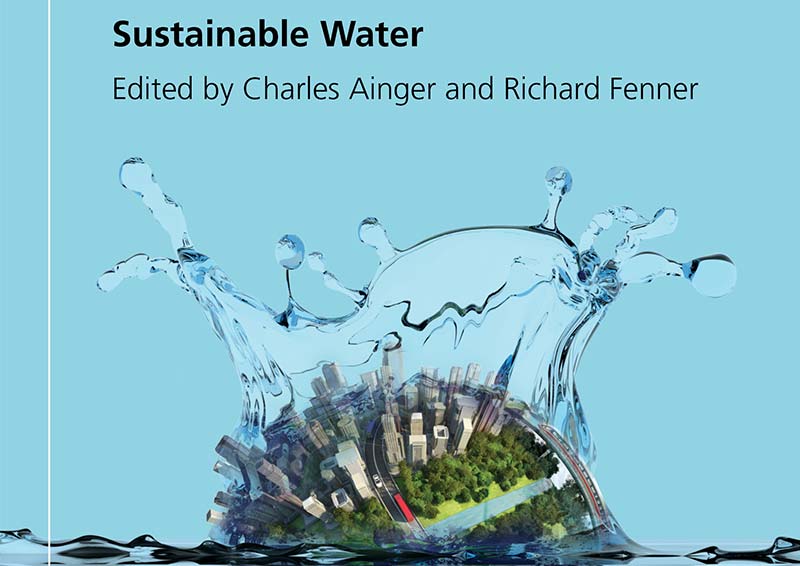Sustainable water
Contents |
[edit] Introduction
The water sector in the UK (and in many other developed countries) is all-too-often taken for granted. Keeping up requires serving more customers, with a better service, and doing more to keep expensive assets maintained and efficient. The future adds huge challenges such as climate change driving increased asset and domestic sewage flooding, less raw water to abstract, how to reduce energy use and carbon emissions, how to increase resource recovery, and how to remove new and difficult chemicals.
All these must demands be met under the pressure of limited affordability. As economies have slowed and inequality increased, customers can no longer afford to pay for water companies to build their way out of trouble. So water organisations' journey to sustainability – continuing to deliver an effective and reliable water and wastewater service despite all these disruptive challenges – is hard, but vital. It requires continuous and dramatic innovation.
[edit] What kind of innovation?
Although new technology is a key part of this, the innovation needed involves much more, for instance:
- New modelling and simulation, for complex urban problems.
- New collaborations between people who have not worked together before, such as farmers, landowners and water utilities.
- New procurement and supply chain business models and behaviour.
- A changed mindset – solving a problem without building anything is equally ‘good engineering’.
The water sector is seen as bad at innovation – slow, because of long-lived assets, and risk averse because of public health responsibilities and exposure to public scrutiny. However, some developments are helping innovation, such as outcomes-based regulation and partnered programme supply chain procurement. Although some brave project teams have translated new ideas into full scale projects – this is usually an exception, done outside the ‘system’.
[edit] The first follower concept
The real innovation failure is in the next step – being much too slow at spreading successful new experience, starting with a ‘first follower’ project. This validates it into something that is then applied much more widely, and becomes embedded in the system, as universal standard practice.
As an example, in 2006, Helsinki implemented a first large scale extraction of heat recovery from sewage effluent; it was publicised in a 2008 article. The authors picked this up and immediately included it in conference presentations. In 2011-12, they got the idea tested as a ‘what-if’ study for the UK situation, in a Masters dissertation; and published. Finally, in early 2016, they read of the first extraction of heat from sewage in the UK.
Must it take 10 years? Can't it be done faster? Engineers look for ‘evidence’, so early, authoritative reporting of first-use ‘demonstrators’ are vital to faster the spreading of new practice. But unlike academics, practitioners have little time and no incentive to publish such accounts. So, much academic material is written about sustainability in many aspects of water, but much less that approaches it from the time-limited, output-driven perspective of the practical engineer/practitioner.
[edit] Crossing the gap
Published in April 2016, Sustainable Water aims to help cross that ‘knowledge gap’. It applies a common set of sustainability principles to water sector practice, and combines this with practical experience and a practical style. Several chapters have been written by authors who are specialists in their respective fields, with a wide range of innovative examples.
Sustainable Water is available to purchase from the ICE Bookshop.
This article originally appeared as Water, swans and sustainability, published by the Institution of Civil Engineers on 16 March 2016. It was written by Charles Ainger and Dick Fenner.
--Institution of Civil Engineers
[edit] Related articles on Designing Buildings Wiki
- Achieving sustainable clean water infrastructure for all.
- Articles by ICE on Designing Buildings Wiki.
- BREEAM Surface water run-off.
- Delivering water efficiency in commercial buildings: A guide for facilities managers.
- Environmental performance of the water and sewerage companies.
- Groundwater control in urban areas.
- Institution of Civil Engineers ICE.
- Mains water.
- Passive water efficiency measures.
- Sustainable urban drainage systems SUDS.
- Sustainable water management.
- The Dublin Statement.
- The SUDS manual.
- Types of water.
- Urban water systems management: A data analytics approach EP 105.
- Urgent Action Water.
- Water Act 2014.
- Water conservation.
- Water consumption.
- Water engineering.
- Water framework directive.
- Water transfers and interconnections.
- World Water Day.
Featured articles and news
Scottish parents prioritise construction and apprenticeships
CIOB data released for Scottish Apprenticeship Week shows construction as top potential career path.
From a Green to a White Paper and the proposal of a General Safety Requirement for construction products.
Creativity, conservation and craft at Barley Studio. Book review.
The challenge as PFI agreements come to an end
How construction deals with inherited assets built under long-term contracts.
Skills plan for engineering and building services
Comprehensive industry report highlights persistent skills challenges across the sector.
Choosing the right design team for a D&B Contract
An architect explains the nature and needs of working within this common procurement route.
Statement from the Interim Chief Construction Advisor
Thouria Istephan; Architect and inquiry panel member outlines ongoing work, priorities and next steps.
The 2025 draft NPPF in brief with indicative responses
Local verses National and suitable verses sustainable: Consultation open for just over one week.
Increased vigilance on VAT Domestic Reverse Charge
HMRC bearing down with increasing force on construction consultant says.
Call for greater recognition of professional standards
Chartered bodies representing more than 1.5 million individuals have written to the UK Government.
Cutting carbon, cost and risk in estate management
Lessons from Cardiff Met’s “Halve the Half” initiative.
Inspiring the next generation to fulfil an electrified future
Technical Manager at ECA on the importance of engagement between industry and education.
Repairing historic stone and slate roofs
The need for a code of practice and technical advice note.
Environmental compliance; a checklist for 2026
Legislative changes, policy shifts, phased rollouts, and compliance updates to be aware of.





















